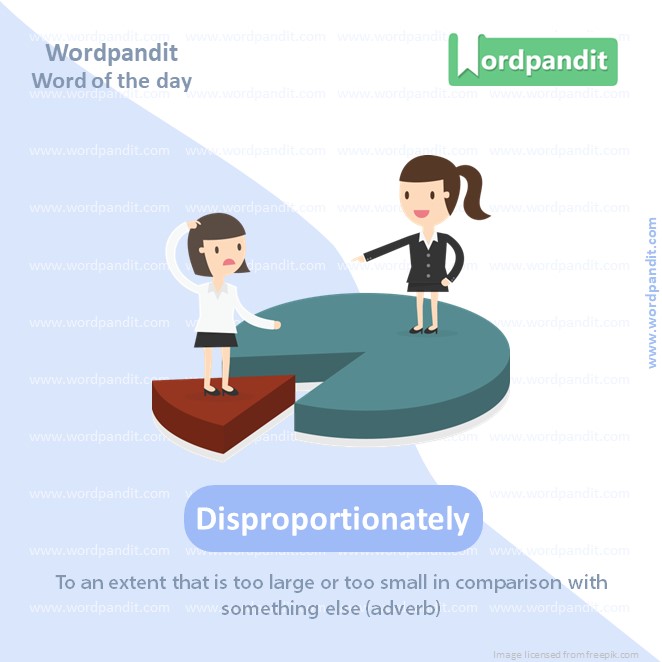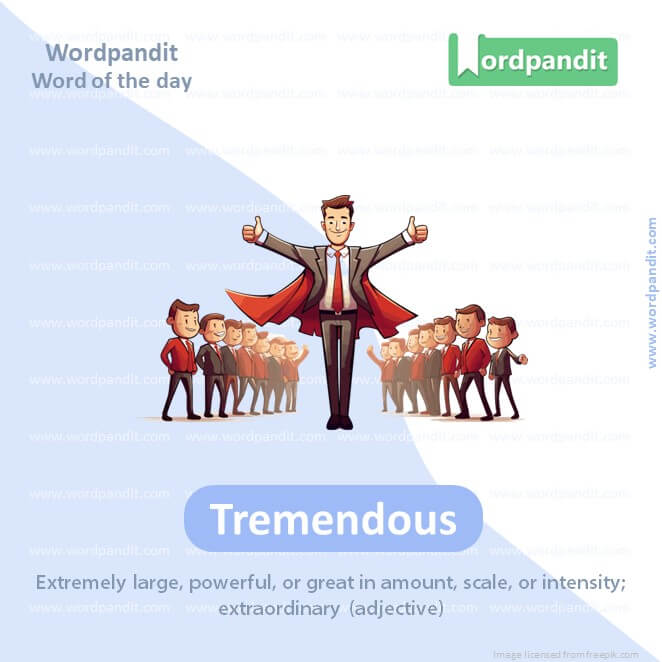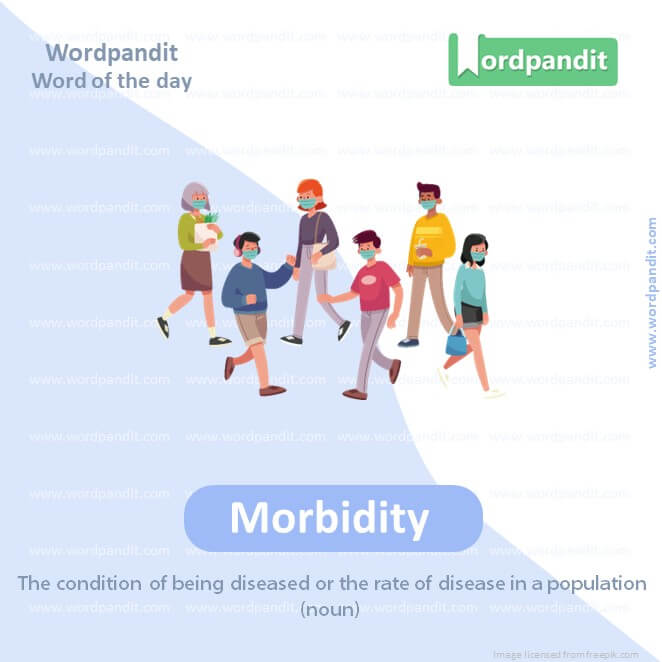Daily Vocabulary Words: List of Daily Used Words
Hi there. Welcome to this special section @ Wordpandit.
Our endeavour here is straightforward: highlighting important daily vocabulary words, you would encounter in The Hindu. This is your repository of commonly used words; essentially, we are posting a list of daily used words. Hence, this has significant practical application as it teaches you words that are commonly used in a leading publication such as The Hindu.
Visit the website daily to learn words from The Hindu.

WORD-1: Proportionate
CONTEXT: During his election campaign, Congress leader Rahul Gandhi has often used the slogan ‘Jitni abadi, utna haq’ (the rights of a group are proportionate to the group’s share in the total population).
SOURCE: The Hindu
EXPLANATORY PARAGRAPH: Imagine sharing a pizza with a friend and making sure each of you gets an equal amount. That’s like something being “proportionate.” It means being the right size or amount in relation to something else, like making sure your backpack isn’t too heavy for your shoulders or that your clothes fit just right.
MEANING: To an extent that is too large or too small in comparison with something else (adverb).
PRONUNCIATION: pruh-PAWR-shuh-nit
SYNONYMS: proportional, commensurate, balanced, equitable, relative, appropriate
USAGE EXAMPLES:
1. The punishment should be proportionate to the crime committed.
2. She ensured her workout routine was proportionate to her fitness goals.
3. The fees charged by the lawyer were proportionate to the services provided.
4. The size of the slice of cake was proportionate to the size of the party.
WORD-2: Exclusionary
CONTEXT: One of the justifications for a caste census is that Indian society is highly diversified and exclusionary.
SOURCE: The Hindu
EXPLANATORY PARAGRAPH: Imagine building a fort out of pillows and blankets and only letting certain friends inside. That’s like something being “exclusionary.” It means keeping some people out and not letting them be a part of something, like not inviting someone to a party or not letting them join a game.
MEANING: Intending or serving to exclude or reject others; tending to exclude or leave out (adjective).
PRONUNCIATION: ik-skloo-zhuh-ner-ee
SYNONYMS: exclusive, discriminatory, segregative, isolating, rejecting, divisive
USAGE EXAMPLES:
1. The country club’s membership policy was exclusionary, limiting membership to a select few.
2. The new housing development faced criticism for its exclusionary zoning practices.
3. The company’s hiring practices were exclusionary, favoring certain demographics over others.
4. The exclusionary nature of the group made it difficult for newcomers to feel welcome.

WORD-3: Unanimously
CONTEXT: This was done unanimously. But in this principle, there is no concept of jitni abadi utna haq. This concept is patently unconstitutional.
SOURCE: The Hindu
EXPLANATORY PARAGRAPH: Imagine playing a game where everyone agrees on the same move, like choosing the same color in a board game or all wanting to watch the same movie. That’s like something being “unanimously.” It means everyone agreeing on something without any disagreement, like all your friends wanting pizza for dinner.
MEANING: In complete agreement; with no one dissenting (adverb).
PRONUNCIATION: yoo-nan-uh-muhs-lee
SYNONYMS: with one accord, without dissent, collectively, consensually, harmoniously
USAGE EXAMPLES:
1. The decision to relocate the office was unanimously approved by the board.
2. The jury reached a unanimous verdict after hours of deliberation.
3. The committee members unanimously agreed on the new policy.
4. The team’s captain was unanimously chosen by the players.

WORD-4: Tremendous
CONTEXT: The Rohini Commission’s initial findings also show that there is a tremendous imbalance even among the beneficiary groups.
SOURCE: The Hindu
EXPLANATORY PARAGRAPH: Imagine lifting a heavy box with all your strength and feeling how heavy it is. That’s like something “tremendous.” It means being very large, great, or powerful, like a big mountain or a strong wind that can knock you over.
MEANING: Extremely large, powerful, or great in amount, scale, or intensity; extraordinary (adjective).
PRONUNCIATION: truh-MEN-duhs
SYNONYMS: enormous, immense, colossal, gigantic, massive, extraordinary
USAGE EXAMPLES:
1. The company made a tremendous profit this quarter.
2. She felt a tremendous sense of relief after completing the marathon.
3. The orchestra received tremendous applause after their performance.
4. The hurricane caused tremendous damage to the coastal towns.

WORD-5: Tentative
CONTEXT: the absence of the other indicators, at that time, population was considered to be a tentative indicator of a fair representation of a group. But that doesn’t mean that it should be the ultimate indicator.
SOURCE: The Hindu
EXPLANATORY PARAGRAPH: Imagine dipping your toe into a pool to test the water temperature before jumping in. That’s like something being “tentative.” It means being uncertain or hesitant, like trying something new but not sure if you’ll like it or agreeing to a plan but not fully committing yet.
MEANING: Not certain or fixed; done without confidence; (adjective).
PRONUNCIATION: TEN-tuh-tiv
SYNONYMS: uncertain, hesitant, cautious, unsure, provisional, tentative
USAGE EXAMPLES:
1. She made a tentative offer on the house, pending a home inspection.
2. The student gave a tentative answer to the difficult question.
3. He approached the unfamiliar task with a tentative attitude.
4. The team’s plans for the project were still tentative and subject to change.

WORD-6: Morbidity
CONTEXT: the forecasting of drugs based on morbidity, and ensuring adequate budget allocation in annual plans to purchase hypertension medication.
SOURCE: The Hindu
EXPLANATORY PARAGRAPH: Imagine feeling sick and needing to stay in bed all day, unable to play or go outside. That’s like “morbidity.” It means relating to illness or disease, like the number of people who get sick in a certain area or the rate of disease in a population.
MEANING: The condition of being diseased; the rate of disease in a population; (noun).
PRONUNCIATION: mawr-BID-i-tee
SYNONYMS: illness, disease, sickness, unhealthiness, morbidity rate
USAGE EXAMPLES:
1. The morbidity rate in the region increased during flu season.
2. The study examined the morbidity associated with obesity.
3. Public health officials are concerned about the rising morbidity rates for certain diseases.
4. Factors such as age and lifestyle can affect morbidity.
WORD-7: Quantifiable
CONTEXT: Second, simplified programme monitoring makes programme performance assessment both quantifiable and actionable.
SOURCE: The Hindu
EXPLANATORY PARAGRAPH: Imagine counting how many toy cars you have or measuring how tall you are with a ruler. That’s like something being “quantifiable.” It means something that can be measured or counted, like the number of apples in a basket or the amount of time it takes to run a mile.
MEANING: Capable of being measured or expressed as a numerical value (adjective).
PRONUNCIATION: kwon-tuh-fahy-uh-buhl
SYNONYMS: measurable, countable, calculable, assessable, determinable, evaluable
USAGE EXAMPLES:
1. The success of the marketing campaign is quantifiable through sales figures.
2. The impact of the policy change on the environment is not easily quantifiable.
3. The company aims to increase its quantifiable metrics such as revenue and customer satisfaction.
4. The effectiveness of the treatment is quantifiable by improvements in patient health.
WORD-8: Comorbidities
CONTEXT: there are non-modifiable risk factors such as family history, an age of over 65 years and pre-existing comorbidities such as diabetes and/or kidney disease, all of which make a person at higher risk of hypertension.
SOURCE: The Hindu
EXPLANATORY PARAGRAPH: Imagine someone who has a broken arm and also gets a cold at the same time. That’s like having “comorbidities.” It means having two or more medical conditions at the same time, like having diabetes and high blood pressure or asthma and allergies.
MEANING: The simultaneous presence of two or more medical conditions or diseases in a patient (noun).
PRONUNCIATION: koh-mawr-BID-uh-tees
SYNONYMS: concurrent conditions, coexisting diseases, multiple ailments
USAGE EXAMPLES:
1. Patients with COVID-19 are at higher risk of severe illness if they have comorbidities such as diabetes or heart disease.
2. The doctor discussed the treatment plan for managing the patient’s comorbidities.
3. The study examined the prevalence of comorbidities in older adults.
4. Comorbidities can complicate medical care and increase the risk of complications.
WORD-9: Reformulate
CONTEXT: there are five approaches: of Surveillance to measure and monitor salt use; Harness industry to promote and reformulate foods and meals that contain less salt; A adopt to standard labelling and marketing; Knowledge, educate and communicate to empower individuals to eat less salt; Environment — support settings that promote healthy eating.
SOURCE: The Hindu
EXPLANATORY PARAGRAPH: Imagine mixing ingredients together to make a cake, but then realizing you forgot to add sugar. That’s like “reformulating.” It means changing or adjusting something, like rewriting a sentence to make it clearer or redesigning a product to make it better.
MEANING: To formulate or express (a plan, idea, etc.) in a new or different way, especially to improve it; to change or alter the composition or structure of something (verb).
PRONUNCIATION: ree-FAWR-myoo-leyt
SYNONYMS: revise, rework, modify, adjust, alter, amend
USAGE EXAMPLES:
1. The company had to reformulate its product after receiving customer feedback.
2. The scientist reformulated the hypothesis based on new experimental results.
3. The chef reformulated the recipe to make it healthier.
4. The team decided to reformulate their strategy after encountering unexpected challenges.
WORD-10: Sensitised
CONTEXT: People also need to be sensitised to read food package labels and make informed decisions.
SOURCE: The Hindu
EXPLANATORY PARAGRAPH: Imagine touching something hot and feeling your skin turn red and sore. That’s like being “sensitized.” It means becoming more aware or responsive to something, like noticing how loud noises make you cover your ears or how spicy food makes your mouth tingle.
MEANING: Made more aware or responsive to something, especially by having been exposed to it repeatedly or deliberately (adjective/verb).
PRONUNCIATION: SEN-suh-tahyzd
SYNONYMS: sensitized, responsive, aware, heightened, attuned, reactive
USAGE EXAMPLES:
1. The training program sensitized employees to issues of diversity and inclusion.
2. Her experience as a volunteer sensitized her to the needs of marginalized communities.
3. The documentary sensitized viewers to the environmental impact of their actions.
4. Continued exposure to violence can sensitize children to aggression and conflict.
Vocabulary Daily Use Words
In the architecturally diverse world of language learning, ‘vocabulary daily use words’ act as a cornerstone. We often take these words for granted, but their significance in day-to-day communications is nothing short of monumental. Mastering these ‘vocabulary daily use words’ should be more than an ancillary task on the sideline; it should take the center stage in your language learning journey.
To begin with, approach ‘vocabulary daily use words’ with the same gusto and reverence as you would an untapped treasure chest. Go beyond the conventional realm of textbooks and explore the world of contemporary literature, newspapers, and digital content. By immersing yourself in these mediums, you’re aligning your learning with real-world language usage, thereby gaining a practical understanding of ‘vocabulary daily use words.’
Memory-enhancing tools add an extra layer of effectiveness to your learning. Flashcards, for example, are a great way to make your study sessions interactive and memory-forging. Coupled with the Leitner system, which is a principle of spacing and repetition, you can ensure better recall and understanding of ‘vocabulary daily use words.’
Furthermore, leveraging mnemonic devices aids in etching the ‘vocabulary daily use words’ into your memory. Associating common words with unique and memorable narratives in your mind enhances their recall. Regular revision and using these words in routine conversations further cement your proficiency.
The potency of immersion as a language learning strategy cannot be emphasized enough. Conversing with native speakers, if possible, provides context to ‘vocabulary daily use words’ and boosts your fluency.
In conclusion, mastering the ‘vocabulary daily use words’ is an enriching journey that requires ongoing effort, continual exposure, and hands-on practice. The strategy of learning through various mediums, using memory-enhancing techniques, leveraging mnemonic devices, and immersion can help demystify these words and enhance your overall language proficiency. So, gear up and embrace the linguistic adventure of mastering the ‘vocabulary daily use words.’







